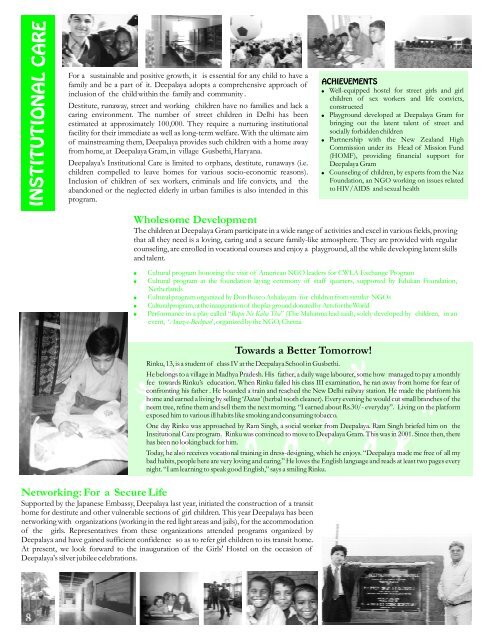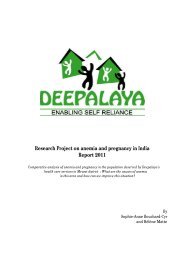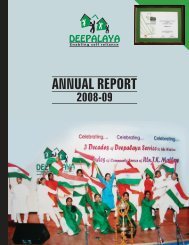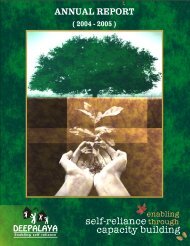Deepalaya Annual Report 2003-2004 (3.79 MB)
Deepalaya Annual Report 2003-2004 (3.79 MB)
Deepalaya Annual Report 2003-2004 (3.79 MB)
Create successful ePaper yourself
Turn your PDF publications into a flip-book with our unique Google optimized e-Paper software.
For a sustainable and positive growth, it is essential for any child to have a<br />
family and be a part of it. <strong>Deepalaya</strong> adopts a comprehensive approach of<br />
inclusion of the child within the family and community .<br />
Destitute, runaway, street and working children have no families and lack a<br />
caring environment. The number of street children in Delhi has been<br />
estimated at approximately 100,000. They require a nurturing institutional<br />
facility for their immediate as well as long-term welfare. With the ultimate aim<br />
of mainstreaming them, <strong>Deepalaya</strong> provides such children with a home away<br />
from home, at <strong>Deepalaya</strong> Gram, in village Gusbethi, Haryana.<br />
<strong>Deepalaya</strong>'s Institutional Care is limited to orphans, destitute, runaways (i.e.<br />
children compelled to leave homes for various socio-economic reasons).<br />
Inclusion of children of sex workers, criminals and life convicts, and the<br />
abandoned or the neglected elderly in urban families is also intended in this<br />
program.<br />
ACHIEVEMENTS<br />
Well-equipped hostel for street girls and girl<br />
children of sex workers and life convicts,<br />
constructed<br />
Playground developed at <strong>Deepalaya</strong> Gram for<br />
bringing out the latent talent of street and<br />
socially forbidden children<br />
Partnership with the New Zealand High<br />
Commission under its Head of Mission Fund<br />
(HOMF), providing financial support for<br />
<strong>Deepalaya</strong> Gram<br />
Counseling of children, by experts from the Naz<br />
Foundation, an NGO working on issues related<br />
to HIV/AIDS and sexual health<br />
Networking: For a Secure Life<br />
Wholesome Development<br />
The children at <strong>Deepalaya</strong> Gram participate in a wide range of activities and excel in various fields, proving<br />
that all they need is a loving, caring and a secure family-like atmosphere. They are provided with regular<br />
counseling, are enrolled in vocational courses and enjoy a playground, all the while developing latent skills<br />
and talent.<br />
<br />
<br />
<br />
<br />
<br />
Cultural program honoring the visit of American NGO leaders for CWLA Exchange Program<br />
Cultural program at the foundation laying ceremony of staff quarters, supported by Edukan Foundation,<br />
Netherlands<br />
Cultural programorganized by Don BoscoAshalayam for children from similar NGOs<br />
Culturalprogram,attheinaugurationof theplaygrounddonatedbyArtsfortheWorld<br />
Performance in a play called “ Bapu Ne Kaha Tha” (The Mahatma had said), solely developed by children, in an<br />
event, ‘ Awaz-e-Bachpan’, organized by the NGO, Chetna<br />
Towards a Better Tomorrow!<br />
Rinku, 13, is a student of class IV at the <strong>Deepalaya</strong>School in Gusbethi.<br />
He belongs to a village in Madhya Pradesh. His father, a daily wage labourer, some how managed to pay a monthly<br />
fee towards Rinku’s education. When Rinku failed his class III examination, he ran away from home for fear of<br />
confronting his father . He boarded a train and reached the New Delhi railway station. He made the platform his<br />
home and earned a living by selling ‘ Datun’ (herbal tooth cleaner). Every evening he would cut small branches of the<br />
neem tree, refine them and sell them the next morning. “I earned about Rs.30/- everyday”. Living on the platform<br />
exposed him to various ill habits like smoking and consuming tobacco.<br />
One day Rinku was approached by Ram Singh, a social worker from <strong>Deepalaya</strong>. Ram Singh briefed him on the<br />
Institutional Care program. Rinku was convinced to move to <strong>Deepalaya</strong> Gram. This was in 2001. Since then, there<br />
has been no looking back for him.<br />
Today, he also receives vocational training in dress-designing, which he enjoys. “<strong>Deepalaya</strong> made me free of all my<br />
bad habits, people here are very loving and caring.” He loves the English language and reads at least two pages every<br />
night.“I am learning to speak good English,” says a smiling Rinku.<br />
Supported by the Japanese Embassy, <strong>Deepalaya</strong> last year, initiated the construction of a transit<br />
home for destitute and other vulnerable sections of girl children. This year <strong>Deepalaya</strong> has been<br />
networking with organizations (working in the red light areas and jails), for the accommodation<br />
of the girls. Representatives from these organizations attended programs organized by<br />
<strong>Deepalaya</strong> and have gained sufficient confidence so as to refer girl children to its transit home.<br />
At present, we look forward to the inauguration of the Girls' Hostel on the occasion of<br />
<strong>Deepalaya</strong>'s silver jubilee celebrations.







